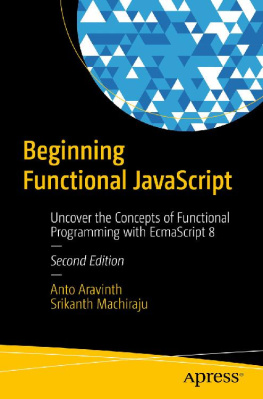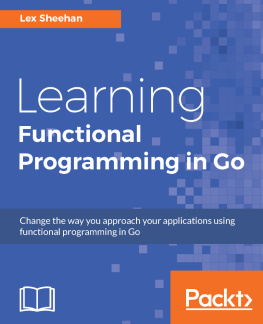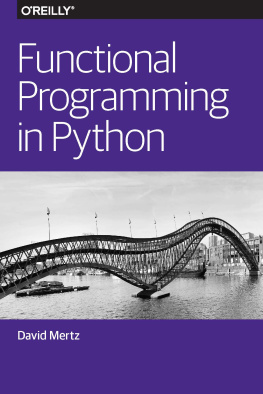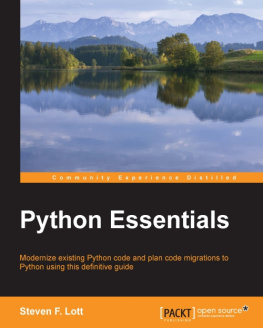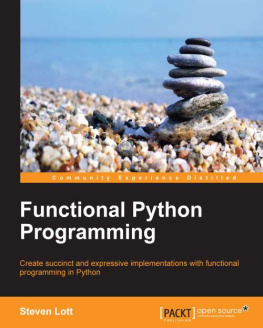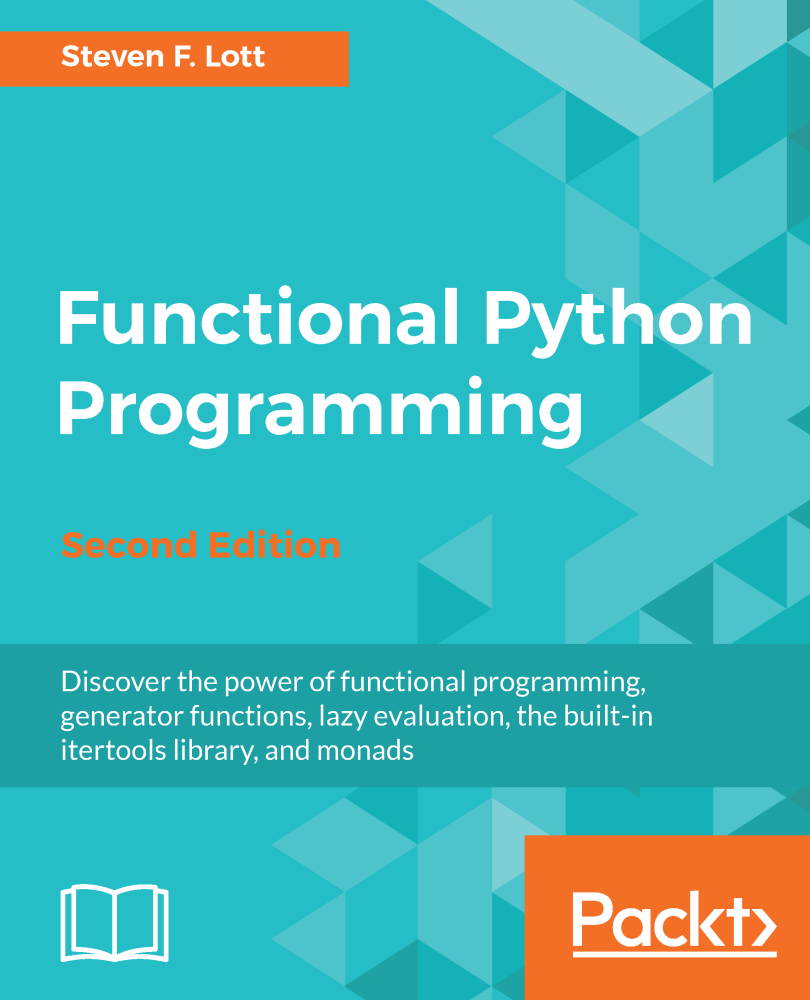Functional Python Programming
Second Edition
Discover the power of functional programming, generator functions, lazy evaluation, the built-in itertools library, and monads
Steven F. Lott

BIRMINGHAM - MUMBAI
Functional Python ProgrammingSecond Edition
Copyright 2018 Packt Publishing
All rights reserved. No part of this book may be reproduced, stored in a retrieval system, or transmitted in any form or by any means, without the prior written permission of the publisher, except in the case of brief quotations embedded in critical articles or reviews.
Every effort has been made in the preparation of this book to ensure the accuracy of the information presented. However, the information contained in this book is sold without warranty, either express or implied. Neither the author, nor Packt Publishing or its dealers and distributors, will be held liable for any damages caused or alleged to have been caused directly or indirectly by this book.
Packt Publishing has endeavored to provide trademark information about all of the companies and products mentioned in this book by the appropriate use of capitals. However, Packt Publishing cannot guarantee the accuracy of this information.
Commissioning Editor: Merint Methew
Acquisition Editor: Sandeep Mishra
Content Development Editor: Priyanka Sawant
Technical Editor: Ketan Kamble
Copy Editor: Safis Editing
Project Coordinator: Vaidehi Sawant
Proofreader: Safis Editing
Indexer: Mariammal Chettiyar
Graphics: Jason Monteiro
Production Coordinator: Deepika Naik
First published: January 2015
Second edition: April 2018
Production reference: 1120418
Published by Packt Publishing Ltd.
Livery Place
35 Livery Street
Birmingham
B3 2PB, UK.
ISBN 978-1-78862-706-1
www.packtpub.com
mapt.io
Mapt is an online digital library that gives you full access to over 5,000 books and videos, as well as industry leading tools to help you plan your personal development and advance your career. For more information, please visit our website.
Why subscribe?
Spend less time learning and more time coding with practical eBooks and Videos from over 4,000 industry professionals
Improve your learning with Skill Plans built especially for you
Get a free eBook or video every month
Mapt is fully searchable
Copy and paste, print, and bookmark content
PacktPub.com
Did you know that Packt offers eBook versions of every book published, with PDF and ePub files available? You can upgrade to the eBook version at www.PacktPub.com and as a print book customer, you are entitled to a discount on the eBook copy. Get in touch with us at service@packtpub.com for more details.
At www.PacktPub.com , you can also read a collection of free technical articles, sign up for a range of free newsletters, and receive exclusive discounts and offers on Packt books and eBooks.
About the author
Steven F. Lott has been programming since the '70s, when computers were large, expensive, and rare. He's been using Python to solve business problems for over 10 years. His other titles with Packt Publishing include Python Essentials, Mastering Object-Oriented Python, Functional Python Programming, and Python for Secret Agents. Steven is currently a technomad who lives in city along the east coast of the U.S. You can follow his technology blog ( slott-softwarearchitect ).
About the reviewer
Yogendra Sharma is a developer with experience in architecture, design, and development of scalable and distributed applications. He was awarded a bachelors degree from the Rajasthan Technical University in computer science. With a core interest in microservices and Spring, he also has hands-on experience in technologies such as AWS Cloud, Python, J2EE, NodeJS, JavaScript, Angular, MongoDB, and Docker.
Currently, he works as an IoT and Cloud Architect at Intelizign Engineering Services Pune.
Packt is searching for authors like you
If you're interested in becoming an author for Packt, please visit authors.packtpub.com and apply today. We have worked with thousands of developers and tech professionals, just like you, to help them share their insight with the global tech community. You can make a general application, apply for a specific hot topic that we are recruiting an author for, or submit your own idea.
Preface
Functional programming offers a variety of techniques for creating succinct and expressive software. While Python is not a purely functional programming language, we can do a great deal of functional programming in Python.
Python has a core set of functional programming features. This lets us borrow many design patterns and techniques from other functional languages. These borrowed concepts can lead us to create succinct and elegant programs. Python's generator expressions, in particular, negate the need to create large in-memory data structures, leading to programs that may execute more quickly because they use fewer resources.
We cant easily create purely functional programs in Python. Python lacks a number of features that would be required for this. We dont have unlimited recursion, for example, we dont have lazy evaluation of all expressions, and we dont have an optimizing compiler.
There are several key features of functional programming languages that are available in Python. One of the most important ones is the idea of functions being first-class objects. Python also offers a number of higher-order functions. The built-in map(), filter(), and functools.reduce() functions are widely used in this role, and less-obvious are functions such as sorted(), min(), and max().
Well look at the core features of functional programming from a Python point of view. Our objective is to borrow good ideas from functional programming languages and use those ideas to create expressive and succinct applications in Python.
Who this book is for
This book is for programmers who want to create succinct, expressive Python programs by borrowing techniques and design patterns from functional programming languages. Some algorithms can be expressed elegantly in a functional style; we canand shouldadapt this to make Python programs more readable and maintainable.
In some cases, a functional approach to a problem will also lead to extremely high-performance algorithms. Python makes it too easy to create large intermediate data structures, tying up memory (and processor time.) With functional programming design patterns, we can often replace large lists with generator expressions that are equally expressive but take up much less memory and run much more quickly.

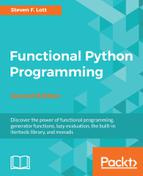
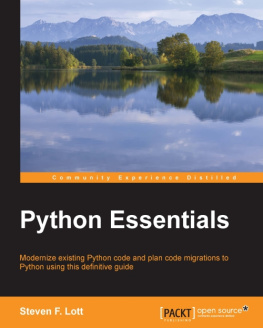



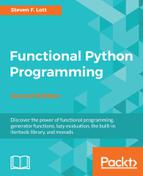
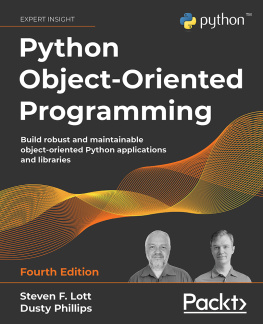

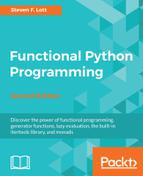
![Anto Aravinth [Anto Aravinth] - Beginning Functional JavaScript: Functional Programming with JavaScript Using EcmaScript 6](/uploads/posts/book/120482/thumbs/anto-aravinth-anto-aravinth-beginning.jpg)
